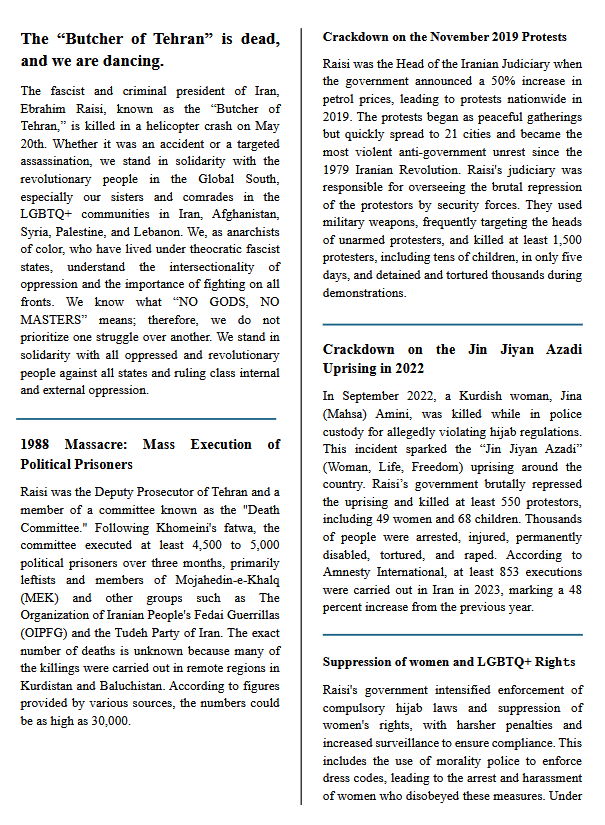
Decolonize Anarchism are a collective of SWANA (Southwest Asian and North African) Anarchists. Despite the similar names, our organisations are not related.
This peice is also avalible as a flyer! You can order copies of this flyer and another by Decolonize Anarchism on our ko-fi.
Decolonize Anarchism – The “Butcher of Tehran” is dead, and we are dancing.
The fascist and criminal president of Iran, Ebrahim Raisi, known as the “Butcher of Tehran,” is killed in a helicopter crash on May 20th. Whether it was an accident or a targeted assassination, we stand in solidarity with the revolutionary people in the Global South, especially our sisters and comrades in the LGBTQ+ communities in Iran, Afghanistan, Syria, Palestine, and Lebanon. We, as anarchists of color, who have lived under theocratic fascist states, understand the intersectionality of oppression and the importance of fighting on all fronts. We know what “NO GODS, NO MASTERS” means; therefore, we do not prioritize one struggle over another. We stand in solidarity with all oppressed and revolutionary people against all states and ruling class internal and external oppression.
1988 Massacre: Mass Execution of Political Prisoners
Raisi was the Deputy Prosecutor of Tehran and a member of a committee known as the “Death Committee.” Following Khomeini’s fatwa, the committee executed at least 4,500 to 5,000 political prisoners over three months, primarily leftists and members of Mojahedin-e-Khalq (MEK) and other groups such as The Organization of Iranian People’s Fedai Guerrillas (OIPFG) and the Tudeh Party of Iran. The exact number of deaths is unknown because many of the killings were carried out in remote regions in Kurdistan and Baluchistan. According to figures provided by various sources, the numbers could be as high as 30,000.
Crackdown on the November 2019 Protests
Raisi was the Head of the Iranian Judiciary when the government announced a 50% increase in petrol prices, leading to protests nationwide in 2019. The protests began as peaceful gatherings but quickly spread to 21 cities and became the most violent anti-government unrest since the 1979 Iranian Revolution. Raisi’s judiciary was responsible for overseeing the brutal repression of the protestors by security forces. They used military weapons, frequently targeting the heads of unarmed protesters, and killed at least 1,500 protesters, including tens of children, in only five days, and detained and tortured thousands during demonstrations.
Crackdown on the Jin Jiyan Azadi Uprising in 2022
In September 2022, a Kurdish woman, Jina (Mahsa) Amini, was killed while in police custody for allegedly violating hijab regulations. This incident sparked the “Jin Jiyan Azadi” (Woman, Life, Freedom) uprising around the country. Raisi’s government brutally repressed the uprising and killed at least 550 protestors, including 49 women and 68 children. Thousands of people were arrested, injured, permanently disabled, tortured, and raped. According to Amnesty International, at least 853 executions were carried out in Iran in 2023, marking a 48 percent increase from the previous year.
Suppression of women and LGBTQ+ Rights
Raisi’s government intensified enforcement of compulsory hijab laws and suppression of women’s rights, with harsher penalties and increased surveillance to ensure compliance. This includes the use of morality police to enforce dress codes, leading to the arrest and harassment of women who disobeyed these measures. Under his watch, at least a dozen feminist activists were arrested and sentenced to long prison terms. Raisi strictly upheld and enforced Iran’s laws criminalizing LGBTQ individuals, leading to severe punishments, including imprisonment and execution. His hardline stance was in line with the broader theocratic regime’s policies, which view same-sex sexual activity as a sin and a crime.
Crackdowns on Labor Movements and Working-Class Protests and Strikes
Raisi’s administration consistently opposed labor movements and used security forces to suppress labor protests and strikes. During his tenure, labor activists and union leaders were arrested and
imprisoned, with strikes and protests met with harsh responses. Just as an example, during Raisi’s term, the government cut budget proposals and insurance for 300,000 to 400,000 construction workers, leading to significant backlash and increased financial insecurity for these workers and their families.
Anti-Immigrant Laws and Afghanophobia
Under Raisi, Iran implemented harsher immigration policies, leading to mass deportations and systemic discrimination against Afghanistani immigrants. Afghanistani immigrants faced restricted access to healthcare, education, and other public services. The government detained undocumented immigrants without due process. Afghanistani immigrants were often exploited in the labor market, taking the most difficult and dangerous jobs. Negative media portrayals and cultural stereotypes exacerbated their marginalization, contributing to a rise in Afghanophobia.
Environmental and animal rights Issues
Despite severe environmental issues, including air pollution, and water shortages, Raisi’s government cut the national budget for combating air pollution by half, reflecting the government’s prioritization of economic growth over environmental protection. These environmental issues disproportionately affect ethnic groups, and marginalized people, especially in water-scarce regions in the South and South East of Iran. Under Raisi’s government, the policy of killing stray dogs escalated, leading to public outcry. The brutal methods, including poisoning and lethal injections, causing prolonged suffering, sparked significant protests from animal rights activists and the public.
Military and Economic Support for Assad and Hezbollah
Raisi’s administration continued to support the Axis of Resistance alliance as a key component of Iran’s foreign policy. Raisi maintained substantial military and economic support to Assad’s regime during the Syrian Civil War, ensuring that Syria remains a key ally in the Axis of Resistance. This support included sending the Iranian Revolutionary Guard Corps (IRGC) forces and backing Hezbollah fighters to violently suppress Syrian opposition forces and prevent the collapse of the Assad regime. Similarly, Raisi advanced supporting Hezbollah in Lebanon to maintain its significant military and political influence. Both the Assad regime and Hezbollah have violently suppressed popular protests in Lebanon and Syria.
